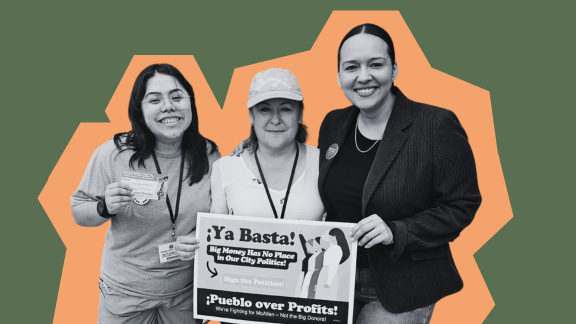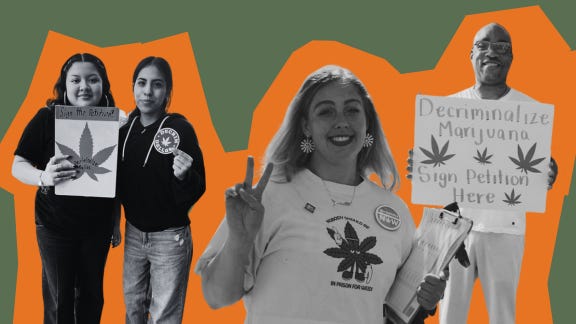Stop Overcomplicating It. We Know What We Need
Ground Game Texas wins campaigns, putting policies that work for working Texans on the ballot
By Catina Voellinger, Executive Director, Ground Game Texas
The pundits keep asking what’s wrong with voters in Texas. Why aren’t people turning out? Why aren’t they responding to messaging?
Here’s the answer: you’re overcomplicating it. Texans aren’t confused, we’re exhausted. And we know exactly what we need. Just ask us.
We need housing we can afford. We need jobs that pay enough to live on. We need an end to criminalizing poverty and a real voice in the decisions that shape our communities, especially when we’re the ones footing the bill. We don’t need more theatrics and hyperbole. We need tools to act and when we have them, we use them. That’s why, since 2021, Ground Game Texas has passed 15 local ballot initiatives across the state, all led by and for working-class Texans.
These wins definitely didn’t come from expensive consultants or national strategies. They came from neighbors organizing around the things that actually keep them up at night and they’re proof that local, working-class organizing is one of the most powerful forces in Texas today; and maybe even for the country.
In November 2024, voters in McAllen, TX passed two major charter amendments. One capped campaign contributions for local officials. The other restored the people’s right to initiative, referendum, and recall. These were basic, common-sense reforms and yet city officials opposed them, delayed implementation, and hoped people would forget. They didn’t. The same residents who signed our petition to get these measures on the ballot and to vote them into law showed up again to demand enforcement when mobilized. And by January 2025, the reforms became law.
This win was the result of long-term dedicated organizing in the Rio Grande Valley, led by the community. Our organizers listened to the needs of the city of McAllen, and crafted a policy responsive to that, rather than seeking to impose a one-size-fits-all solution from the top. But it’s not only McAllen.
In city after city, Texans are using direct democracy to pass practical policies rooted in lived experience. We’ve voted to decriminalize marijuana in Killeen, Denton, San Marcos, Harker Heights, Elgin, Lockhart, Bastrop, Austin and Dallas. Proposition R passed in Dallas with a supermajority, even after the police chief and association tried to derail it with outdated fear tactics.
Voters have also raised the minimum wage in the Rio Grande Valley, passed criminal justice reforms in Austin and San Marcos, and defeated an anti-abortion travel ban in Amarillo. In Lockhart and Harker Heights, residents fought to protect their wins when city officials tried to repeal them, and this fight is constantly evolving in lockstep with our community.
We’ve had 15 victories in four years for the working class. Not just in so-called progressive cities, but in rural towns and conservative counties. Across race, income, and generation. These campaigns succeeded not because they were performative but because they were genuine. They were born from community. These are working-class victories.
Our process. Getting from issue to ballot is never simple—but we’ve built a process rooted in listening, relationship-building, and political education. We start by talking to people: one-on-ones, running community surveys, and networking with local leaders and organizations. In some towns, there’s not much formal infrastructure, so we look to the places where people naturally gather—small businesses, locals—and connect with trusted messengers and local activists. Once we’ve confirmed the issue resonates, we research the local charter and identify what’s legally possible. We look at precedent from other cities, develop draft policy, and work with attorneys to make sure it’s sound—especially in Texas, where we have to think proactively about both offense and defense. We ask: Who will try to stop this? What tactics will they use? Then we build our program with those realities in mind.
We tailor each campaign to fit local law, and before we collect a single signature, we ensure there’s a clear communications plan, legal strategy, and a locally rooted team ready to respond to disinformation and bad-faith opposition. That means hiring and training staff and volunteers directly from the communities we’re working in and supporting them with the tools, resources, and political education to lead. We also staff a Texas-based remote data intake team who go signature by signature to validate signers, digitize their contact info, and flag whether they’re registered, and if any of their information needs updating. This isn’t just paperwork. It’s about trust. Our people in Texas already have deep skepticism of government systems that have failed them.
We cannot afford to promise change and then fall short. The last thing we want is to get folks excited, only for the policy to fail to make the ballot. Every step of our process is designed to make sure the organizing experience is real, solid, and leaves people feeling more powerful than before. This work is hard, but it’s also where the future lives. We’re not just trying to win campaigns—we’re building pipelines of leadership and spreading the skills that will shape what comes next.
So when people say, “Texas is too hard,” I push back. What’s really hard is pretending not to see what’s right in front of you. Texans aren’t waiting to be saved—we know far too well that our liberation comes from the streets, not the halls of government. We’re organizing ourselves. What we need isn’t more top-down messaging. We need investment in the infrastructure that’s already working.
We don’t show up with pre-written answers, we show up with questions. What’s broken in your neighborhood? What would justice look like here? Then we build together. That’s it.
It’s not that complicated. Still, every election cycle, pundits act shocked when people don’t respond to the latest branding exercise. They scramble to analyze voter behavior, searching for complexity when the truth is simple. Working-class people don’t need to be decoded. They need to be respected. They want a future they can see themselves in and a path to fight for it.
That’s what these local wins represent: Clarity. Power. Trust. Most of all, trust in people who’ve been ignored for too long.
What we have planned next is bold, unapologetic, and grounded in real life, not headlines. We’re not waiting for permission. We’re building a future that Texans like us deserve: one rooted in dignity, freedom, and care for every member of our community.
If you believe in that future, join us. Pull up a chair, bring a friend—because we ALL belong at the table, not on the menu.
Catina Voellinger is the Executive Director of Ground Game Texas. Catina’s upbringing led her to a career dedicated to challenging injustices, advocating for workers' rights, and promoting racial equity.
Catina co-founded the first worker-owned political consultancy cooperative in the U.S. At Ground Game Texas, Catina leads with the mission of building progressive infrastructure, strengthening community, and driving long-term change. Catina will be a guest on It Needs to Be Said, the Grassroots Connector Substack Live. Look for an announcement later this month.






I live in Vermont, where everything becomes unnecessarily complicated. Texas Ground Game goes to the core and dispenses with the frippery. Your model is what a lot of us need to implement. Too much of what goes on here is performative, even if heartfelt. Thank you for so clearly spelling out a more effective and meaningful approach. It is very much how I did things up when I was doing community based projects in my home state on the west coast. It works.
Really Heartening! Thank you Ground Game Texas! So when do we win elections?